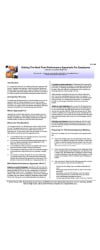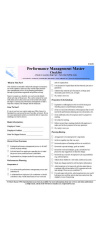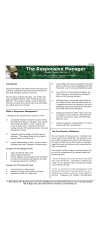Despite all the technological innovations, and shifts in THINKING about employee performance, how to measure it, and how to evaluate it, performance management and appraisal still has both feet firmly planted in a manufacturing and production mindset. The problem is that the world of work has changed from the post-war era, away from producing goods, which can be easily counted, to working with knowledge — brain work, if you like. Not only that, society has changed.
Below are ten shifts that are necessary to modernize and update how we manage performance.
1) Negotiating Goals and Objectives, Not Dictating
Employees know far more about their jobs than their supervisors, in addition to wanting to be more involved in steering the direction of their jobs. No longer does it make sense for goals and objectives to be dictated by the manager. When employees are active in determining what they need to do to contribute to the company, you’ll find higher levels of employee engagement and commitment.
2) Job Descriptions Recognized As Poor Source For Employee Goals
Job descriptions have always been a poor source for setting employee goals because they are often outdated by the time they are on paper. What we want from employees can’t be derived from job descriptions but must be drawn from what each employee does, and the employee’s specific strengths and weaknesses. Today, jobs are simply too complex to capture easily in job descriptions, and employees need to flex out of job description included tasks.
3) Individualizing Expectations Even For Employees “Doing The Same Job”
The “old notion” is that if you have ten staff in the same position, that they should be expected to do the same things, and be evaluated in the same way. The modern workplace doesn’t work like that. Each person, even in the same job, ends up doing somewhat different things, because each brings unique strengths to the job. So, people in the same position often do quite different things, and should be rewarded and recognized for their unique contributions.
4) Managers Understand Employee Engagement Can Be Fostered Through Proper Management of Performance
Employee engagement comes from employees seeing the meaning of their work — how they contribute, so they feel they are making a difference. Performance management is THE tool to help establish meaning of work, because it helps employees understand how their jobs fit into the whole. Managers need to understand, also, that the reliance on rating forms for evaluation is a waste, and tends to squash employee engagement.
5) Putting To Bed The Myth Of Objectivity
No evaluations or employee reviews are objective. Subjectivity abounds so we need to stop pretending that our ways of evaluating employee performance are objective. What is important is setting agreed upon goals and objectives, establishing key indicators, and then working with the employee so there is common understanding of goals, and agreement on how to measure them. Again, this means a negotiated approach.
6) Realizing Rating Employees Is A Convenience, Not A Way Of Improving Performance
Rating forms are convenient but have little potential for improving performance. Performance reviews can succeed IN SPITE of these terrible and demoralizing tools, and managers and HR departments need to move past them, or even eliminate them. The essence is in the ongoing year long communication.
7) The Past Is Over. The Purpose Of Reviews Is Improvement
Move the purpose of performance reviews away from “evaluating” the past, and to iimproving success in the future. The value of reviews lies in their power to identify barriers to performance, and address them in a problem-solving way.
8) Recognize Employee Performance Is Not Always Under Their Control and Focus On The System
While individuals do control some aspects of their job performances, much more of what employees do is dictated and influenced by the environments they work in. That doesn’t absolve employees from responsibility, but it does mean that one has to look at the larger system to improve performance. Manager and employee can look to the review as a time to discuss ALL barriers to employee performance, not just the ones under the control of the employee, and move to remove those barriers.
9 ) Human Resource Departments Need To Enable Managers, Not Insist On Conformity
Human Resources (HR) departments need to enable managers by providing them with a variety of tools, rather than dictate a one-size-fits-all system that is imposed upon managers and staff.
10) Enable Employees To Become Partners In Managing And Improving Their Own Performance And The Effectiveness Of Their Work Units
Managers receive training in performance appraisals (usually poor training), but employees never do. We need to prepare employees to become active participants in the entire management process, since they possess most of the knowledge managers need to improve performance. Also, employees need to understand deep down, that today’s performance reviews are not their Father’s reviews, and no longer will they “be done to”, but are now expected to participate actively in their own successes, and partner with their managers. That means providing employees with help in understanding how to participate actively and WHY that participation benefits THEM
More Resources On Performance Appraisals And Management
Robert is the author of a number of best-selling books on performance management and employee reviews, published by McGraw-Hill. Visit his author page here.






